- Home
- Nick Hornby
How to Be Good Page 5
How to Be Good Read online
Page 5
‘Two hundred pounds.’
‘I can go back as many times as I want. For anything. For free.’
‘But he fixes everything first time. So you don’t need to.’
‘That’s why he’s worth the money. That’s why he charges so much.’
He bows again, up down up down, and grins at me; I shake my head and go to find my children.
*
Later, we watch TV together, as a family, and not for the first time recently I wonder how an evening can be so ordinarily domestic when life isn’t that way. Even over the last few weeks, despite Stephen, and despite all the viciousness, we have developed a new Monday night routine, supper on laps during Walking with Dinosaurs; family ritual seems to be like some extraordinarily hardy desert flower, prepared to have a go at blooming in the most inhospitable terrain.
David still attempts to ruin our harmony – first by lying on the floor and attempting to do sit-ups (he is foiled by his girth and his general fitness level, rather than his back, but because it is not his back that has stopped him, he spends several minutes extolling the virtues of GoodNews, and he has to be hushed by the children), and then by poking fun at the commentary. ‘Three weeks later, the male returns for another attempt at mating,’ says Kenneth Branagh. ‘Are you sure it wasn’t a fortnight, Ken?’ says David. ‘Because it was a hundred million years ago, after all. You might find you’re a few days out.’
‘Shut up, David. They’re enjoying it.’
‘Bit of critical rigour won’t kill them.’
‘That’s just what you need when you’re a kid. Critical rigour.’
But we settle, in the end, and we watch the programme, bath the kids, put them to bed, eat an almost silent meal. And all the time I’m on the verge of saying something, doing something, except that I don’t know what to say or do.
Next morning Tom spends his breakfast time staring at me and David, and after a little while I begin to find it disconcerting. He is a disconcerting child, Tom – he’s quiet, quick on the uptake, direct to the point of being rude. He has the personality of a child prodigy, but no discernible talent.
‘What’s the matter with you?’ I ask him.
‘Nothing.’
‘Why do you keep staring at us?’
‘I want to see if you’re getting divorced.’
If this were a film I’d be holding a coffee mug to my lips, and Tom’s words would provoke a huge joke splutter, and coffee would be coming out of my nose and running on to my blouse. But as it is I’m putting toast in the toaster, and I have my back to him.
‘Why would we be getting a divorce?’
‘Someone at school told me.’
He says this with no sense of grievance; if someone at work told me that I was getting a divorce and I’d had no prior awareness of any marital difficulties, I would be more upset about the source of the news than anything else. But of course childhood is a time when information flies at you from all directions, and to Tom it’s all the same whether he hears this news from his mother and father or from little Billy in 2C.
‘Who?’ says David, with slightly too much aggression, thus revealing himself immediately as the source of the leak.
‘Joe Salter.’
‘Who the hell’s Joe Salter?’
‘This kid at school.’
‘What’s it got to do with him?’
Tom shrugs. He’s not interested in Joe Salter. He’s interested in whether David and I are splitting up. I can see his point.
‘Of course we’re not getting a divorce,’ I say. David looks at me triumphantly.
‘Why did Joe Salter say you were, then?’ Tom asks.
‘I don’t know,’ I say. ‘But if we’re not, it doesn’t really matter what Joe Salter says, does it?’ I had never heard Joe Salter’s name until three minutes ago, and I’m sick of him already. I have a very strong mental image of a smug, malevolent little blond boy, angelic looking to everyone but his classmates and, now, David and me, all of whom have had a glimpse into his stinking, poisonous soul. ‘I mean, we know more about it than he does. And we’re staying married, aren’t we, David?’
‘If you say so.’ He’s really enjoying this, and I can’t say I blame him.
‘Will you ever get divorced?’ asks Molly. Jesus. I can now see, for the first time, just how many worms a can holds, and why it’s not a good idea to open one under any circumstances.
‘We’re not planning to,’ I tell her.
‘Who would we live with if you did?’
‘Who would you want to live with?’ asks David. This is not a question you will find recommended in even the most brutal childcare books.
‘Daddy!’ says Molly. And then, as an afterthought, ‘But not Tom.’
‘Tom can go and live with Mummy, then. That’s fair.’
‘Daddy’s joking,’ I say to Tom quickly, but I suspect the damage has already been done: David has alienated brother from sister, daughter from mother and son from father in the time it takes to eat a bowl of Golden Grahams. And I’ve just promised not to divorce him. ‘Doh!’ as my brother and my son and Homer Simpson would say.
At my insistence, David comes to the surgery at lunchtime and we go to a greasy spoon around the corner, to talk about what was said at breakfast. David is unrepentant. (Or should that be: David is Unrepentant. Like James Bond is 007.)
‘If we’re not getting divorced, what harm can it do? It’s a purely hypothetical situation.’
‘Come on, David. You can do better than that.’
‘Than what? What was I doing?’
‘Setting traps.’
‘What, the “if we’re not getting divorced . . .” bit, you mean? That’s a trap?’
‘You want me to say “Ah, but we might be . . .” And then you’d hammer me for being inconsistent, and telling you one thing and the kids another.’
For some time now I have looked on David’s verbal landmines with some contempt, so clunkingly obvious are they (and it should come as no surprise that the author of The Green Keepers is as clunkingly obvious in conversation as he is in prose). But clearly I’ve been getting sloppy, because David seizes on my last remark with an alacrity that suggests he’d been hoping I’d say precisely that.
‘Hold on, hold on. What did you tell me when you called me from Leeds?’
‘I didn’t . . . Well, I did, but I just wanted . . .’
‘No. What did you say?’
‘You know what I said.’
‘Say it again.’
‘You don’t have to do this, David. You know what I said then, and you know what I said to the kids this morning.’
‘And that’s consistent, is it?’
‘I can see that from your point of view it might appear inconsistent.’
‘And what about from yours? Because, really, I’m interested. I want to know how asking for a divorce and then saying you don’t want one appears anything but.’
‘None of this is the point.’ And I really mean that. I want to find out how he could ask our daughter to choose between one parent and another, and why he was so unthinkingly cruel to Tom, and why he’s been telling the parents of small boys called Joe Salter, or friends of the parents of small boys called Joe Salter, or even small boys called Joe Salter, about our marital difficulties. It’s fair enough that I should want to know these things, just as it is fair enough that he should want to know why I told him I wanted the marriage to end, apparently out of the blue; but we only have a lunchtime to talk. And suddenly it seems that a lifetime wouldn’t be long enough, let alone a lunchtime, because if a breakfast conversation can be broken down into this many tiny pieces, none of which can be put back together, then how many tiny pieces could we extract from the last quarter of a century? He said and I said and he said and I said and he thought and I thought and he thought and I thought and he did this and I did that and . . . It shouldn’t be like this. This isn’t the way it’s supposed to be. If it had been what we thought and what we did, there wouldn’t be anything
to argue about, because we had thought and done it together, but the only thing we have managed to do together is create an enormous mess, and I just can’t see how . . .
‘David, I just can’t see how we’re going to get out of this mess.’
‘What are you talking about now?’
I try to get the words out – the words I have used once, and retracted only this morning – but luckily they won’t come, and instead I burst into tears, and sob and sob and sob, while David leads me out of the café and into the street.
It could well be that I am going mad; or, on the other hand, that I am simply confused and unhappy; or, on the third hand, that I know exactly what I want but cannot bring myself to do it because of all the pain it would cause, and the tension between those two states of being makes me want to explode. But when David touches me in that way, with tenderness, with love and concern, it all dribbles away to nothing, and I just want to be with him and my kids for the rest of my life. I don’t want to touch Stephen, I don’t want to row about what David may or may not have said to other people, or what he certainly said to Molly and Tom. I just want to do my job during the day, watch dinosaurs in the evening, sleep with David at night. Nothing else matters. All I need to do is hold on to this feeling, and I’ll be fine.
We go and sit in the car for a little while, and David lets me cry.
‘I can’t let this go on,’ he says.
‘It won’t. This is the end of it.’
‘Do you want to tell me what’s been going on?’
Typical David. Typical man. Something has to have been ‘going on’ for someone to be in this kind of state . . . Except, of course, he’s right, and something has been going on, something that has, without any shadow of a doubt, contributed to my recent unhappiness. Suddenly, what with the dinosaur decision, and David being nice to me, and this conviction I have that the tears mark the end of all this, it seems very clear to me what I should do and say.
‘David . . . I’ve been seeing someone.’
I tell him because I know I’m not seeing someone any more, and because I know in my own head what I want, and because I know that this will communicate itself to David. It doesn’t occur to me for a moment that for David my confession marks the beginning of something, not the end of something, and just because he has known me for twenty-five years it doesn’t mean that he knows me or understands me now. He’s quiet for a moment, and then he says, ‘Can you come straight home tonight?’
‘Yes. Sure. Of course. We’ll talk about it then.’
‘There’s nothing to talk about. But I want to do something about Molly’s eczema, and I need you to look after Tom.’
I play a game with myself, just to see what it feels like. The game goes like this: I am not sitting in the kitchen of the marital home watching my son doing his homework, but in the kitchen of a small flat nearby. In the game, this is where I now live, after my separation. Molly is not here because at the moment she is refusing to talk to me; she blames me for what has happened (David must have given her a very skewed account of events), and every time I try to talk to her she turns her back. David’s terrible joke about dividing the family down the middle has turned out to be a prosaic and obvious prediction.
In some ways, this game is instructive. Why, for example, have I chosen to imagine this kitchen as a different kitchen? Why, in other words, do I find it so difficult to imagine that I would be the one who stays put in the event of domestic meltdown? It’s not just because I’m the guilty party (although there are mitigating circumstances, and I’m not as guilty as all that, and my marriage is brutal and degrading, sort of, although admittedly it’s a gentle, middle-class version of brutality and degradation); it’s because I am the breadwinner. David takes the kids to school; David makes their tea, and supervises their homework; David picks them up from the homes of their friends, friends I have never met. If David and I split up, then my departure would cause minimal disruption, whereas if he left, I don’t know how we would manage. I’m the man. I’m the daddy. Not because I have a job, but because David doesn’t, not really, and is therefore the primary carer. That is why it is so easy for me to imagine moving out – because fathers always move out. And that’s why it’s so easy to imagine Molly not talking to me – she would never choose me over David, and in any case, a daughter always refuses to speak to her father after she has discovered he’s been having an affair. There’s all that stuff that goes on, the whole Freudian thing. Is it too much to suggest that Molly is actually sexually jealous of me?
‘Tom?’
‘Yo.’
‘Do you think of me as your mum or your dad?’
‘What?’
‘Don’t even think about it, just say the first thing that comes into your head.’
‘Mum.’
‘Are you sure? You didn’t have to think for a couple of seconds because you were confused?’
‘No. I think of you as my mum, and Dad as my dad.’
‘Why?’
‘Mum, I’m really busy, OK?’ And he shakes his head sadly.
Molly has always suffered from eczema, ever since she was very little. She gets it everywhere – hands, arms, legs, stomach – and no amount of creams or diets or homeopathic remedies have managed to affect it. This morning, before she went to school, I applied a very powerful and probably harmful steroid cream to her hands, which were covered in painful-looking cracks. But when she comes home, she runs down the hall and thrusts her hands at me, and there’s not a trace of it anywhere. I lift up her fleece, and it’s the same story on her stomach; she shows me the backs of her legs, and there’s nothing there either. And of course my stomach turns over when I hear Molly and David come in, and of course I’m terrified about what this evening might hold; but all any of us can talk about is what has happened to Molly’s ugly red sores. (And if Molly’s eczema is more important than my adultery, then what is the point of adultery in the first place?)
‘That’s amazing,’ I say.
‘He just touched it and it went away,’ says Molly. ‘I could see it go.’
‘He didn’t just touch it,’ says David. ‘He used a cream.’
‘He didn’t, Daddy. I was watching. He didn’t do anything. He just touched it.’
‘With the cream.’
‘He just touched it, Mummy.’
‘Who just touched it?’
‘DJ GoodNews.’
‘Ah. DJ GoodNews. I should have known. Is there nothing DJ GoodNews can’t do?’
‘He happened to mention that he was good with eczema,’ says David. ‘So I thought it was worth a try.’
‘Backs and eczema. That’s quite an unusual combination of specialisms.’
‘He did Daddy’s headache as well,’ says Molly.
‘What headache?’ I ask David.
‘Just a . . . just a normal headache. I just happened to mention that I had one, and he . . . massaged my temples. It was good.’
‘So, head, eczema, back. He’s a real wizard, isn’t he? Another two hundred quid?’
‘And you don’t think this is worth it?’
I snort, although I don’t know what the snort is intended to convey. I don’t know why I’m being like this. I would have paid double that to make Molly better, but the opportunity to snipe is always irresistible, whatever the circumstances.
‘You should go, Tom,’ says Molly. ‘It’s great. You go all warm.’
‘That’s the cream,’ says David. ‘He did that with my back.’
‘He didn’t use any cream. Daddy, why do you keep saying he used cream when he didn’t?’
‘You couldn’t see what he was doing.’
‘I could. Anyway, I know what cream feels like. It feels creamy . . .’
‘Der!’ says Tom. (For the benefit of those unfamiliar with apparently meaningless pre-teen monosyllables ‘Der!’ is completely different from ‘Doh!’ As I understand it, the latter is an admission of stupidity on the part of the speaker, whereas the former implies s
trongly that someone else is stupid. The former, incidentally, is accompanied by a rather unattractive face – screwed-up eyes, protruding teeth – intended to illustrate said stupidity.) Molly ignores him. ‘. . . And his hands didn’t feel creamy at all.’
Something weird is going on here, because David won’t let this drop; it is clear that this conversation will continue until Molly has denied the evidence of her own senses.
‘That is complete nonsense, Molly. Read my lips: He . . . Was . . . Using . . . Cream.’
‘Does it matter?’ I ask him mildly.
‘Of course it matters!’
‘Why?’
‘She’s fibbing. And we don’t like fibbing, do we, Molly?’
‘Yeah,’ says Tom, unpleasantly. ‘Fibber! Liar!’
Molly bursts into tears, shouts ‘It’s not fair! I hate you all!’ and runs up to her bedroom; and thus the first GoodNews we have had in weeks is deftly turned into yet another source of upset and difficulty.
‘Well done, David. Again.’
‘She shouldn’t tell fibs, should she, Dad?’
‘He was using cream,’ says David, to no one in particular. ‘I saw him.’
David apologizes to Molly (not, I have to say, because he wants to, but because I suggest that it would be the mature and fatherly thing to do), and Tom apologizes to Molly, and Molly apologizes to us, and we settle down again. And this, at the moment, is what constitutes peace in our time: the two hours between the argument about the quack doctor and his creams and the discussion about my affair with another man and whether it constitutes the end of my marriage.
‘Shall we talk now?’ I say to David when the kids are in bed.
‘What about?’
‘About what I told you at lunchtime.’
‘What do you want to say about it?’
‘I’d have thought you’d want to say something.’
‘No.’
‘You just want to leave it at that?’
‘I don’t want to leave it at anything. I’m just presuming that you’ll be moving out in the next couple of days.’ There’s something different about David, but I’m not sure what. I was certain that he’d do his David thing, which would involve a lot of ranting, some raving, several million caustic remarks and an awful lot of contempt directed towards Stephen. But there’s nothing like that; it’s almost as if he doesn’t care any more.

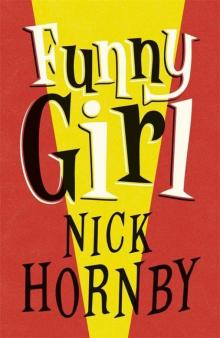 Funny Girl
Funny Girl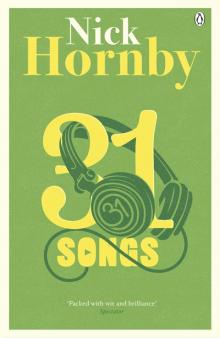 31 Songs
31 Songs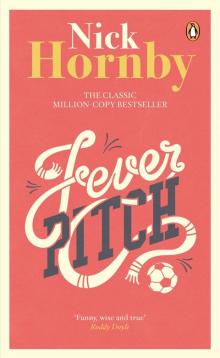 Fever Pitch
Fever Pitch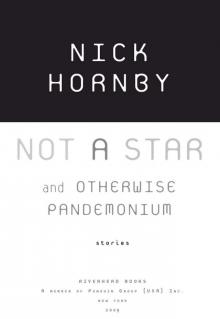 Not a Star and Otherwise Pandemonium
Not a Star and Otherwise Pandemonium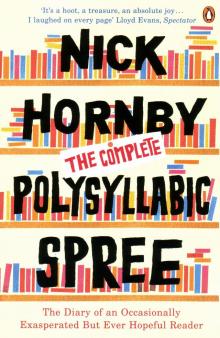 The Complete Polysyllabic Spree
The Complete Polysyllabic Spree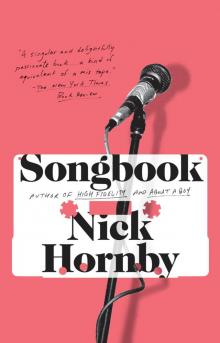 Songbook
Songbook An Education
An Education Slam
Slam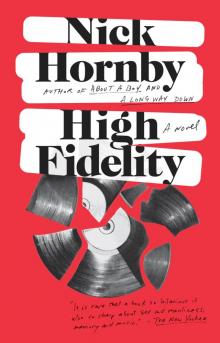 High Fidelity
High Fidelity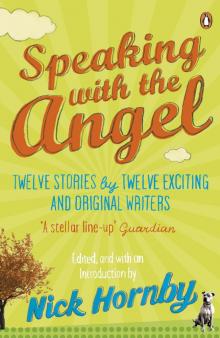 Speaking With the Angel
Speaking With the Angel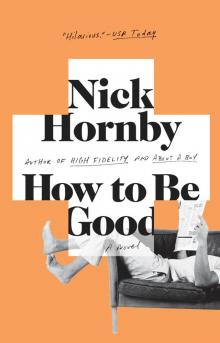 How to Be Good
How to Be Good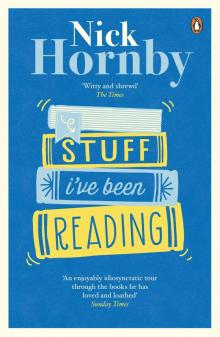 Stuff I've Been Reading
Stuff I've Been Reading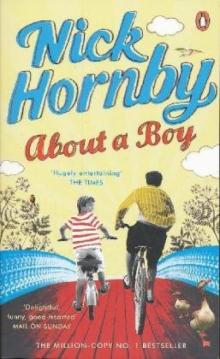 About a Boy
About a Boy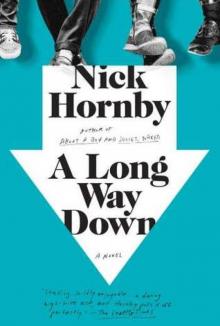 A Long Way Down
A Long Way Down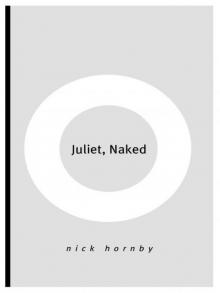 Juliet, Naked
Juliet, Naked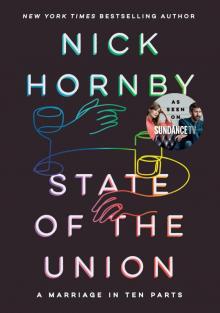 State of the Union
State of the Union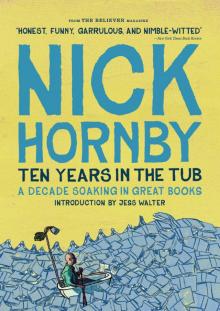 Ten Years in the Tub: A Decade Soaking in Great Books
Ten Years in the Tub: A Decade Soaking in Great Books Books, Movies, Rhythm, Blues: Twenty Years of Writing About Film, Music and Books
Books, Movies, Rhythm, Blues: Twenty Years of Writing About Film, Music and Books Just Like You
Just Like You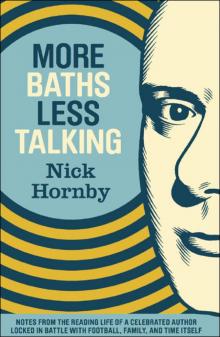 More Baths Less Talking
More Baths Less Talking Books, Movies, Rhythm, Blues
Books, Movies, Rhythm, Blues